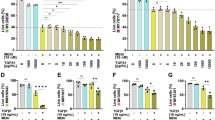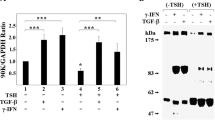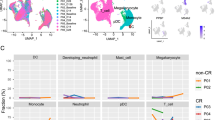Abstract
To characterize the TGF-β1 response of monocytic leukemia cells, we analyzed the effects of TGF-β1 on cell proliferation, differentiation, and apoptosis of human monoblastic U937 cells. Treatment of cells with TGF-β1 in the absence of growth factors significantly enhanced cell viability. Flow cytometric analysis of DNA content and CD14 expression revealed that TGF-β1 does not affect cell proliferation and differentiation. Consistent with these results was the finding that no transcriptional induction of Cdk inhibitors such as p21Waf1, p15Ink4b, and p27Kip1 was detected following TGF-β1 treatment. Interestingly, however, pretreatment of TGF-β1 significantly inhibited Fas-, DNA damage-, and growth factor deprivation-induced apoptosis. This antiapoptotic effect was totally abrogated by anti-TGF-β1 antibody. Quantitative RT-PCR analysis demonstrated a dose- and time-dependent transcriptional up-regulation of Bcl-X(L), suggesting its implication in the TGF-1-mediated antiapoptotic pathway. We also observed elevated expression of c-Fos and PTEN/MMAC1. But, no detectable change was recognized in expression of c-Jun, Fas, Fadd, Fap-1, Bcl-2, and Bax. Taken together, our study shows that TGF-β1 enhancement of cellular viability is associated with its antiapoptotic effect, which may result from the transcriptional up-regulation of Bcl-X(L).
Similar content being viewed by others
Article PDF
Author information
Authors and Affiliations
Rights and permissions
This is an Open Access article distributed under the terms of the Creative Commons Attribution Non-Commercial License (http://creativecommons.org/licenses/by-nc/3.0/) which permits unrestricted non-commercial use, distribution, and reproduction in any medium, provided the original work is properly cited.
About this article
Cite this article
Lee, J., Park, BJ., Park, JH. et al. TGF-β1 inhibition of apoptosis through the transcriptional up-regulation of Bcl-X(L) in human monocytic leukemia U937 cells. Exp Mol Med 31, 126–133 (1999). https://doi.org/10.1038/emm.1999.21
Published:
Issue date:
DOI: https://doi.org/10.1038/emm.1999.21



